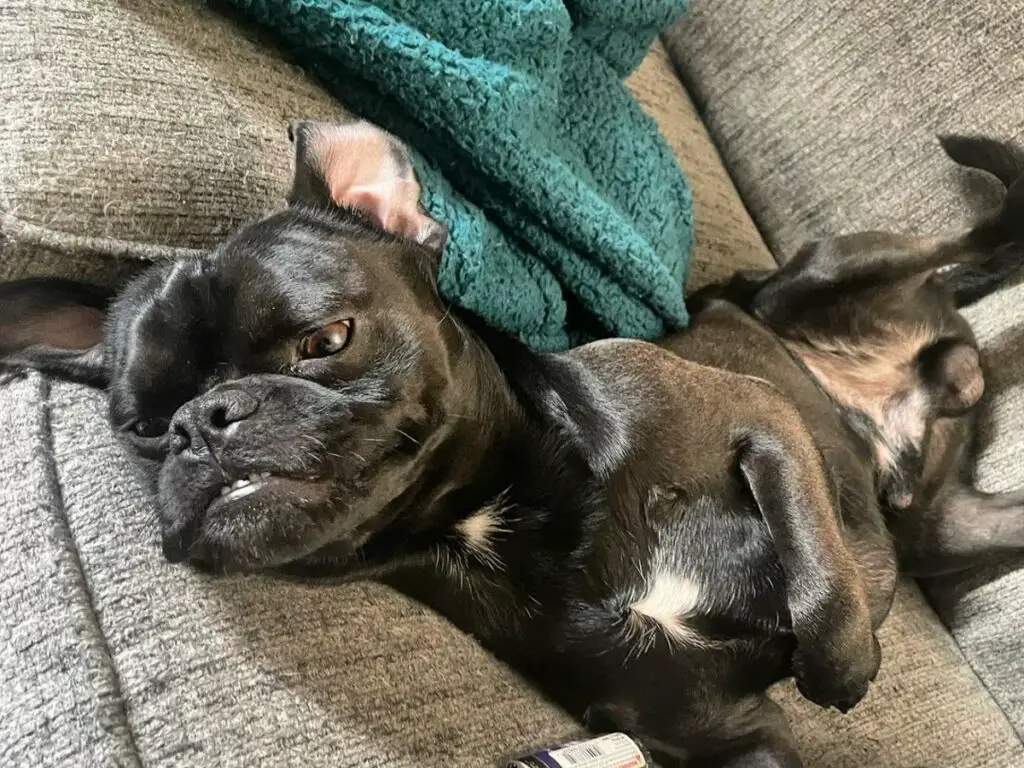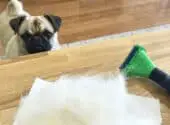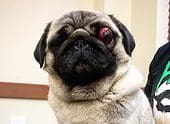Pugs are distinguished by their strong and muscular build, which adds to their charm! That’s why it’s easy to spot when your Pug has recently dropped a few pounds.
So does your Pug look a little thin? Did you, at some point, ask yourself the following questions: is my Pug underweight? Is this bad for his health?
In this guide, we answer these questions and more.

How To Tell If Your Pug Is Underweight
Here are some simple tips on how to tell if your Pug is underweight.
Look at your Pug’s waistline.
Determining if your pug has become too thin is relatively straightforward; simply observe their side profile from a distance and look for an overly slim waistline. This signifies the loss of muscle mass, and suggests that the dog needs to consume more calories to reach a healthy weight.
Check your Pug’s ribs.
To assess whether a dog is underweight, it is wise to observe the ribs; if they appear particularly visible or protruding, it may be the case that your Pug has not received sufficient nourishment and thus requires additional caloric intake to reach their preferred body weight.
Alternatively, you should place one hand on the back of their neck and the other along their spine. Using your fingertips, apply a comforting yet firm pressure until you can detect the presence of a ribcage beneath the fur. If each bone is easily felt with minimal effort, then it may indicate that your Pug needs to gain weight.
Feel your Pug’s spine.
Don’t forget to assess the spine as well. Do this by firmly placing one hand on each side of the spine and applying even pressure with both hands. Your pup should have an even layer of fat covering the spine’s vertebrae on each side. If there appear to be any bony areas or an abnormally thin structure, then your pup may not be at a healthy weight — time for more meals.
Reasons Why Your Pug Is Underweight
This section of the guide enumerates possible explanations for why your Pug is underweight and what you can do about them.
Poor Nutrition
Adequate nutrition is paramount for sustaining the health of all animals, including domestic pets like Pugs. It is absolutely essential to identify the causes of any potential underweight issues with your Pug and take appropriate steps to ensure its nutritional needs are met.
For example, if you’re feeding them low-quality food or not providing a balanced meal with enough calories for their level of activity, then it could be causing them to shed pounds over time.
To ensure your pup’s wellbeing, make sure to feed them a nutritious diet with adequate amounts of proteins and carbohydrates. If you are uncertain as to what type of food is most beneficial for their size and breed, consult a veterinarian or animal nutritionist for advice.
If you recently changed your dog’s food brands, see if reverting back to the original one will benefit you. Otherwise, it is recommended that you seek the guidance of a veterinary professional to find alternatives that would satisfy their dietary requirements.
Advanced Age
Advanced age can be a delicate stage in life, even more so for Pugs. As they age, their metabolism slowly declines, and motor skills deteriorate- weight loss is a likely result unless correctly overseen. Furthermore, old-age-related illnesses like arthritis or joint pain can be uncomfortable during ingestion or physical exertion and thus result in lower appetite and diminished activity levels.
You can do several things to ensure your old pup gets enough food and nutrients.
Firstly, try feeding them smaller meals more frequently throughout the day, as this will entice their appetite. Heating up the food before giving it to them can also be beneficial since its distinctive smell is more noticeable and captivating.
Moreover, supplementing your pet’s diet with either wet or canned dog food, as these are higher in water content and therefore much easier for them to consume than dry kibbles.
Dental Problems

When considering factors contributing to weight loss, dental issues are often not considered. Pugs and other dogs must acquire the right nutrition to sustain their health; nevertheless, if oral hygiene is neglected, it can significantly impede a canine’s ability to benefit from nutritional intake.
Bacteria can accumulate on their gums and teeth, leading to inflammation that reduces their food consumption capacity and overall energy levels. Furthermore, plaque accumulation on the teeth can create a situation in which they find it difficult, if not painful, to chew or swallow correctly.
Ensure the dental health of your Pug by brushing its teeth daily with a soft-bristled toothbrush and appropriate dog toothpaste. Additionally, providing crunchy treats that promote plaque removal and chew toys formulated to reduce oral bacteria will further support the maintenance of their pearly whites.
Underlying Health Conditions
If you’ve noticed that your Pug has been looking a little too skinny lately, an underlying medical issue may be at hand. Specifically, gastrointestinal conditions may lead to inadequate nutrient absorption, vomiting, diarrhea, malnutrition, and reduced body mass for dogs.
Canine diabetes may be the explanation for a Pug unexplainably losing weight. This ailment can exhibit itself in numerous ways, with a frequent sign being an unexpected reduction in body mass. Changes in appetite and increased thirst are also signs of canine diabetes.
Other potential issues responsible for canine weight loss include metabolic, maldigestion, and malabsorptive disorders.
You may also want to check the medications that they’re taking. Medications have been known to significantly alter a dog’s weight, often resulting in them becoming underweight.
Parasites
Parasites are a risk to the health of your Pug, which can cause them to become weak and underweight if they do not receive the correct nutrition. This issue should be addressed as soon as possible, as parasites can potentially devastate their well-being. Here are some potential causes for why your Pug may have parasites and what steps you can take to improve their health.
One of the prevalent factors leading to pets contracting parasites is contact with wild animals or other pets outside the home. Fleas, ticks, roundworms, and tapeworms are all common offenders when it comes to infecting our furry companions.
Your Pug is vulnerable to harm if they remain unsupervised while outdoors. Furthermore, contact with unclean soil and water can lead to infection or contamination. Any biting and itching around their tail or abdomen may indicate that something’s amiss; you should investigate these potential signs of skin infection further.
If you believe that parasites are the cause of your Pug’s decreased weight. In that case, it is essential to speak with a veterinarian to receive an accurate diagnosis and appropriate treatment options.
Is My Pug Underweight: The Takeaway
Awareness of the signs of an underweight Pug is essential for any responsible pet parent. Examples of what to look out for include overly thin waistlines and protruding ribs. The diet, exercise, medication intake, and overall health condition should be reviewed if any of these symptoms manifest. Ultimately, consulting a veterinarian will ensure all necessary steps can be taken to help your Pug reach their ideal weight.




